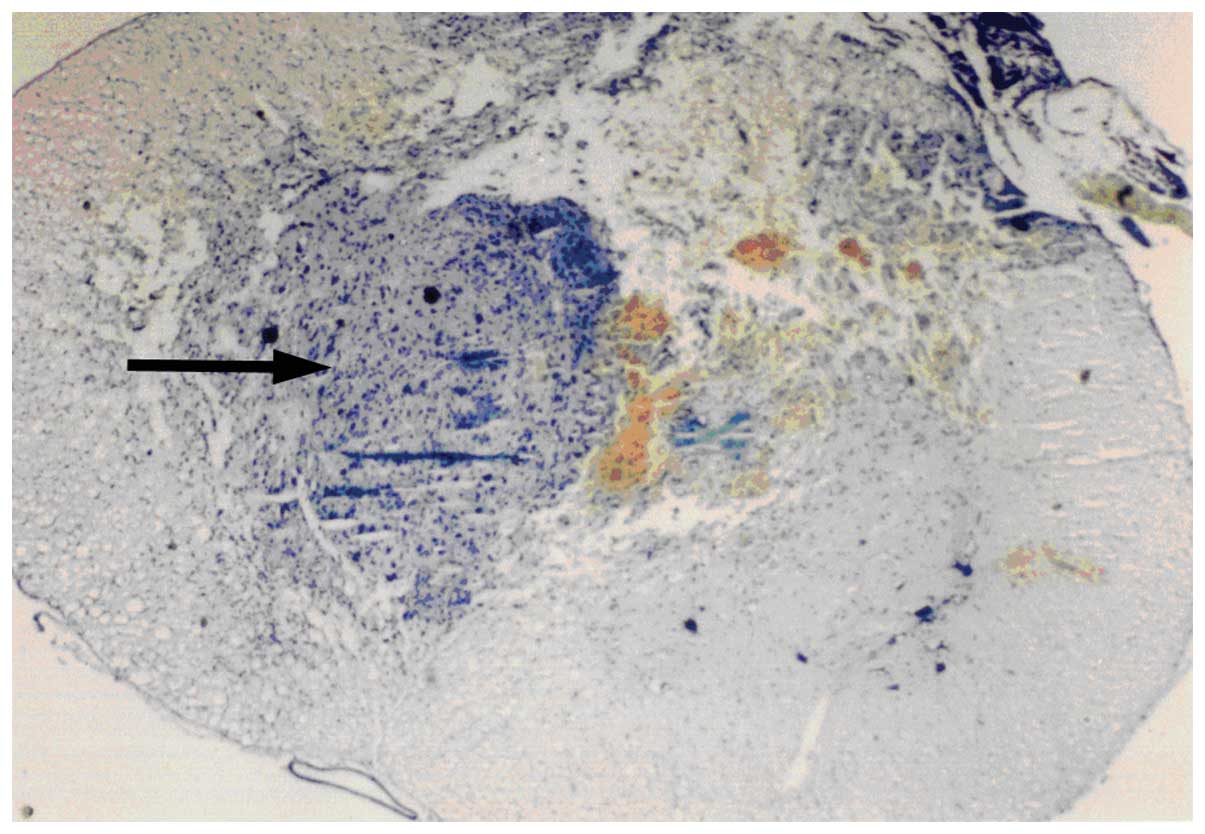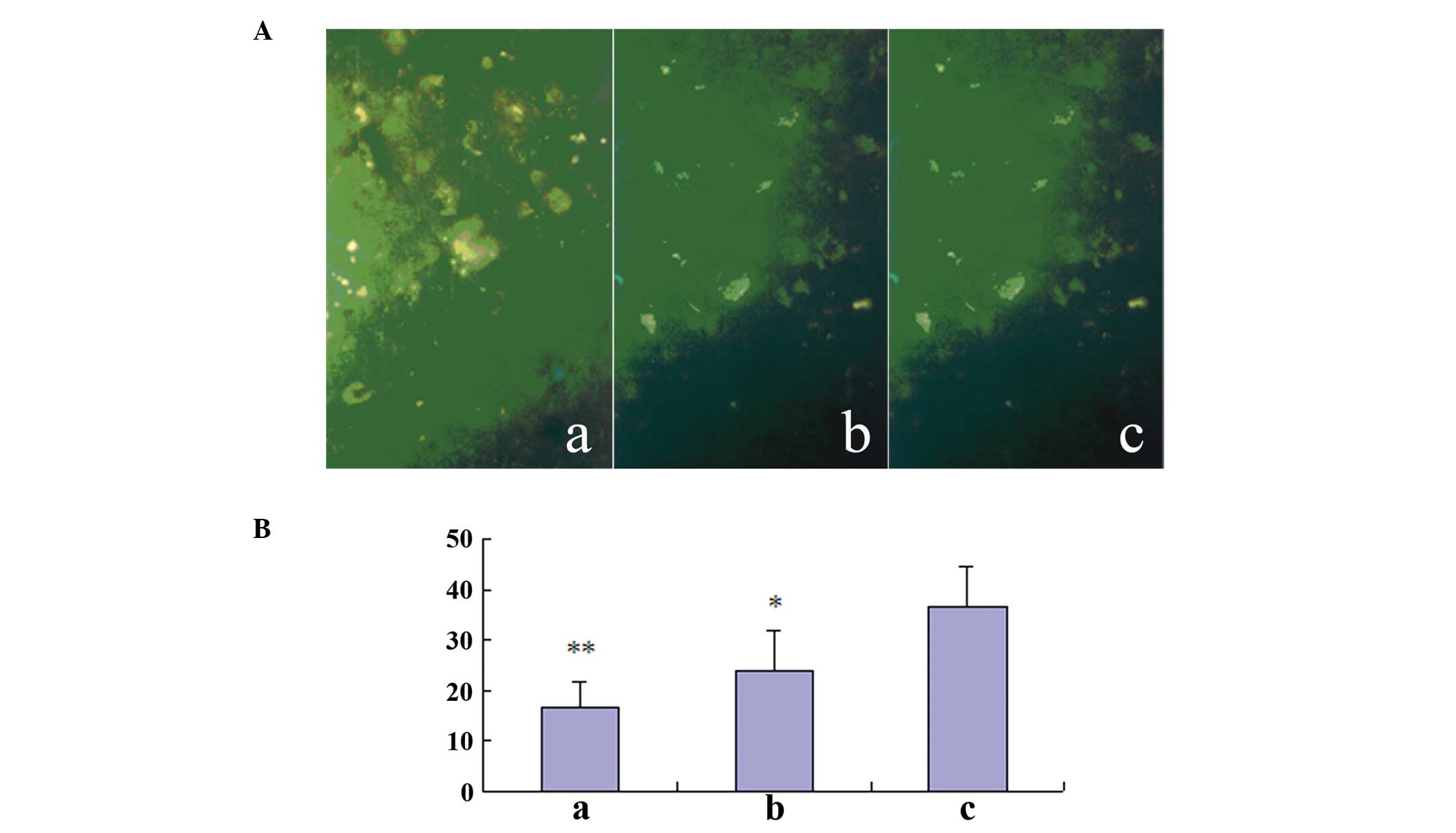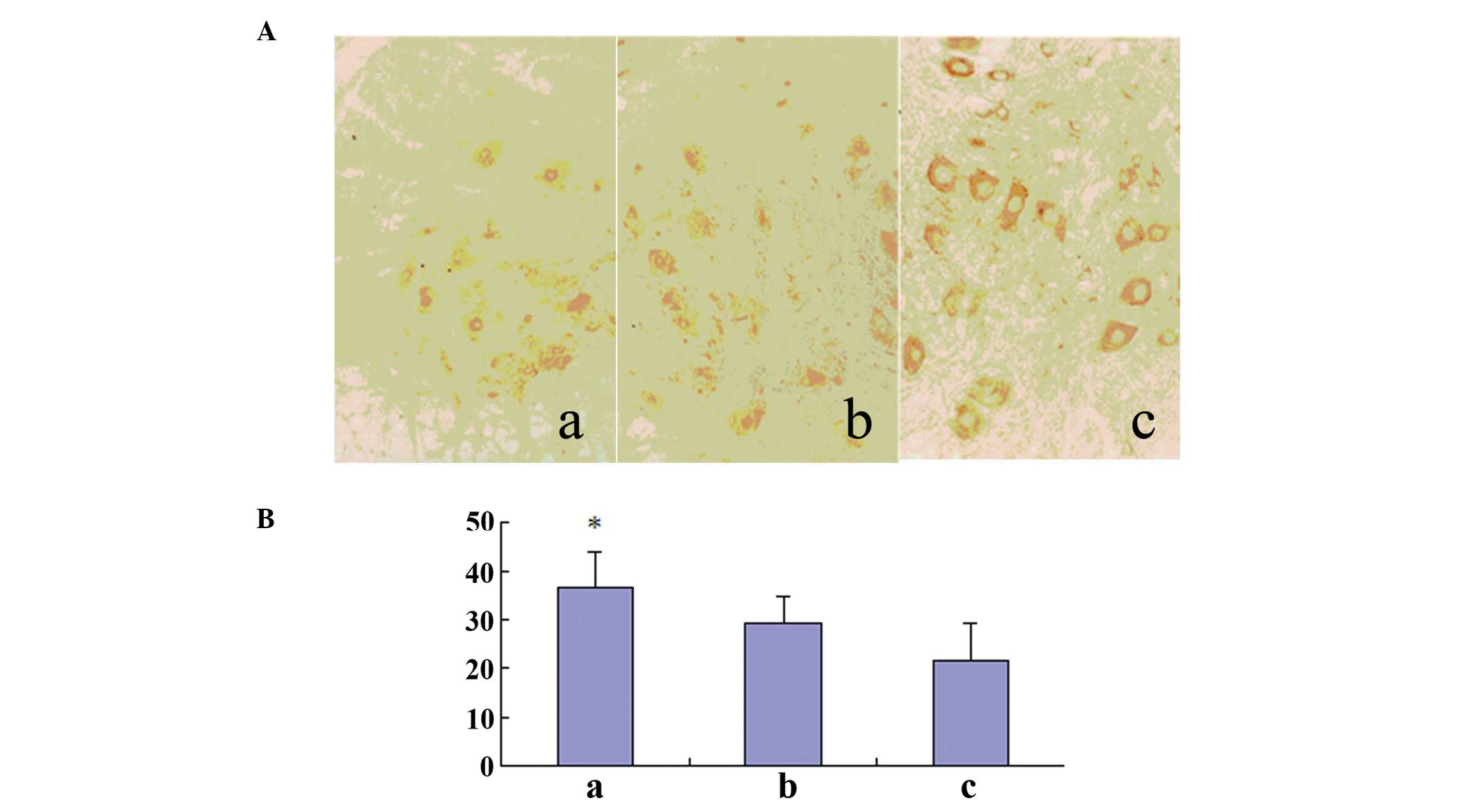|
1
|
Lu Y and Wang MY: Neural stem cell grafts
for complete spinal cord injury. Neurosurgery. 71:N13–N15. 2012.
View Article : Google Scholar : PubMed/NCBI
|
|
2
|
Sun HH, Gao F, Liu B, Yu HT, Kong N and
Liu GM: Inhibition of Nogo expression to promote repair after
spinal cord injury. Chin Med J (Engl). 125:4044–4048.
2012.PubMed/NCBI
|
|
3
|
Sung WH, Chiu TY, Tsai WW, Cheng H and
Chen JJ: The effect of virtual reality-enhanced driving protocol in
patients following spinal cord injury. J Chin Med Assoc.
75:600–605. 2012. View Article : Google Scholar : PubMed/NCBI
|
|
4
|
Sharma A: Pharmacological management of
acute spinal cord injury. J Assoc Physicians India. 60(Suppl):
13–18. 2012.
|
|
5
|
Londhey VA: Acute spinal cord injury-the
unchanged challenges! J Assoc Physicians India. 60(Suppl): 5–6.
2012.PubMed/NCBI
|
|
6
|
Boulenguez P and Vinay L: Strategies to
restore motor functions after spinal cord injury. Curr Opin
Neurobiol. 19:587–600. 2009. View Article : Google Scholar : PubMed/NCBI
|
|
7
|
MacDermott AB, Mayer ML, Westbrook GL, et
al: NMDA-receptor activation increases cytoplasmic calcium
concentration in cultured spinal cord neurons. Nature. 321:519–522.
1986. View
Article : Google Scholar : PubMed/NCBI
|
|
8
|
Shiva S, Moellering D, Ramachandran A, et
al: Redox signalling: from nitric oxide to oxidized lipids. Biochem
Soc Symp. 107–120. 2004.PubMed/NCBI
|
|
9
|
Park E, Velumian AA and Fehlings MG: The
role of excitotoxicity in secondary mechanisms of spinal cord
injury: a review with an emphasis on the implications for white
matter degeneration. J Neurotrauma. 21:754–774. 2004. View Article : Google Scholar : PubMed/NCBI
|
|
10
|
Hama A and Sagen J: Combinations of
intrathecal gamma-amino-butyrate receptor agonists and
N-methyl-d-aspartate receptor antagonists in rats with neuropathic
spinal cord injury pain. Eur J Pharmacol. 683:101–108. 2012.
View Article : Google Scholar
|
|
11
|
Kim Y, Cho HY, Ahn YJ, Kim J and Yoon YW:
Effect of NMDA NR2B antagonist on neuropathic pain in two spinal
cord injury models. Pain. 153:1022–1029. 2012. View Article : Google Scholar : PubMed/NCBI
|
|
12
|
Hunanyan AS, Petrosyan HA, Alessi V and
Arvanian VL: Repetitive spinal electromagnetic stimulation opens a
window of synaptic plasticity in damaged spinal cord: role of NMDA
receptors. J Neurophysiol. 107:3027–3039. 2012. View Article : Google Scholar : PubMed/NCBI
|
|
13
|
Kunkel-Bagden E and Bregman BS: Spinal
cord transplants enhance the recovery of locomotor function after
spinal cord injury at birth. Exp Brain Res. 81:25–34. 1990.
View Article : Google Scholar : PubMed/NCBI
|
|
14
|
Tian Z, Yu W, Liu HB, et al:
Neuroprotective effects of curculigoside against NMDA-induced
neuronal excitoxicity in vitro. Food Chem Toxicol. 50:4010–4015.
2012. View Article : Google Scholar : PubMed/NCBI
|
|
15
|
Berry JN, Sharrett-Field LJ, Butler TR and
Prendergast MA: Temporal dependence of cysteine protease activation
following excitotoxic hippocampal injury. Neuroscience.
222:147–158. 2012. View Article : Google Scholar : PubMed/NCBI
|
|
16
|
Wang LN, Yang JP, Ji FH, et al:
Brain-derived neurotrophic factor modulates N-methyl-D-aspartate
receptor activation in a rat model of cancer-induced bone pain. J
Neurosci Res. 90:1249–1260. 2012. View Article : Google Scholar : PubMed/NCBI
|
|
17
|
Choi SS, Hahm KD, Min HG and Leem JG:
Comparison of the spinal neuropathic pain induced by intraspinal
injection of N-methyl-d-aspartate and quisquate in rats. J Korean
Neurosurg Soc. 50:420–425. 2011. View Article : Google Scholar : PubMed/NCBI
|
|
18
|
Guo F, Maeda Y, Ko EM, et al: Disruption
of NMDA receptors in oligodendroglial lineage cells does not alter
their susceptibility to experimental autoimmune encephalomyelitis
or their normal development. J Neurosci. 32:639–645. 2012.
View Article : Google Scholar
|
|
19
|
García-Alías G, Petrosyan HA, Schnell L,
et al: Chondroitinase ABC combined with neurotrophin NT-3 secretion
and NR2D expression promotes axonal plasticity and functional
recovery in rats with lateral hemisection of the spinal cord. J
Neurosci. 31:17788–17799. 2011.PubMed/NCBI
|
|
20
|
Guide for the Care and Use of Laboratory
Animals 1996. National Institutes of Health publication;
Washignton, D.C: pp. 85–23. 1996
|
|
21
|
Schnell L, Hunanyan AS, Bowers WJ, et al:
Combined delivery of Nogo-A antibody, neurotrophin-3 and the
NMDA-NR2d subunit establishes a functional ‘detour’ in the
hemisected spinal cord. Eur J Neurosci. 34:1256–1267.
2011.PubMed/NCBI
|
|
22
|
Becker D and McDonald JW III: Approaches
to repairing the damaged spinal cord: overview. Handb Clin Neurol.
109:445–461. 2012. View Article : Google Scholar : PubMed/NCBI
|
|
23
|
All AH, Bazley FA, Gupta S, et al: Human
embryonic stem cell-derived oligodendrocyte progenitors aid in
functional recovery of sensory pathways following contusive spinal
cord injury. PLoS One. 7:e476452012. View Article : Google Scholar
|
|
24
|
Kosaka Y, Kin H, Tatetsu M, Uema I and
Takayama C: Distinct development of GABA system in the ventral and
dorsal horns in the embryonic mouse spinal cord. Brain Res.
1486:39–52. 2012. View Article : Google Scholar : PubMed/NCBI
|
|
25
|
Lin S, Wang Y, Zhang C and Xu J:
Modification of the neurotrophin-3 gene promotes cholinergic
neuronal differentiation and survival of neural stem cells derived
from rat embryonic spinal cord in vitro and in vivo.
J Int Med Res. 40:1449–1458. 2012. View Article : Google Scholar : PubMed/NCBI
|
|
26
|
Faden AI, Lemke M, Simon RP and Noble LJ:
N-methyl-D-aspartate antagonist MK801 improves outcome following
traumatic spinal cord injury in rats: behavioral, anatomic, and
neurochemical studies. J Neurotrauma. 5:33–45. 1988. View Article : Google Scholar : PubMed/NCBI
|
|
27
|
Nakashima K, Yamashita K, Uesugi S and Ito
H: Temporal and spatial profile of apoptotic cell death in
transient intracerebral mass lesion of the rat. J Neurotrauma.
16:143–151. 1999. View Article : Google Scholar : PubMed/NCBI
|
|
28
|
Chen TA, Yang F, Cole GM and Chan SO:
Inhibition of caspase-3-like activity reduces glutamate induced
cell death in adult rat retina. Brain Res. 904:177–188. 2001.
View Article : Google Scholar : PubMed/NCBI
|
|
29
|
Matute C, Domercq M and Sánchez-Gómez MV:
Glutamate-mediated glial injury: mechanisms and clinical
importance. Glia. 53:212–224. 2006. View Article : Google Scholar : PubMed/NCBI
|
|
30
|
Bakiri Y, Hamilton NB, Káradóttir R and
Attwell D: Testing NMDA receptor block as a therapeutic strategy
for reducing ischaemic damage to CNS white matter. Glia.
56:233–240. 2008. View Article : Google Scholar : PubMed/NCBI
|
|
31
|
Lou J, Lenke LG, Xu F and O’Brien M: In
vivo Bcl-2 oncogene neuronal expression in the rat spinal cord.
Spine (Phila Pa 1976). 23:517–523. 1998. View Article : Google Scholar
|
|
32
|
Nakahara S, Yone K, Sakou T, et al:
Induction of apoptosis signal regulating kinase 1 (ASK1) after
spinal cord injury in rats: possible involvement of ASK1-JNK and
p38 pathways in neuronal apoptosis. J Neuropathol Exp Neurol.
58:442–450. 1999. View Article : Google Scholar : PubMed/NCBI
|
|
33
|
Abe Y, Yamamoto T, Sugiyama Y, et al:
Apoptotic cells associated with Wallerian degeneration after
experimental spinal cord injury: a possible mechanism of
oligodendroglial death. J Neurotrauma. 16:945–952. 1999. View Article : Google Scholar
|
|
34
|
Profyris C, Cheema SS, Zang D, et al:
Degenerative and regenerative mechanisms governing spinal cord
injury. Neurobiol Dis. 15:415–436. 2004. View Article : Google Scholar : PubMed/NCBI
|
|
35
|
Itoh Y, Mizoi K and Tessler A: Embryonic
central nervous system transplants mediate adult dorsal root
regeneration into host spinal cord. Neurosurgery. 45:849–856. 1999.
View Article : Google Scholar : PubMed/NCBI
|
|
36
|
Medalha CC, Jin Y, Yamagami T, Haas C and
Fischer I: Transplanting neural progenitors into a complete
transection model of spinal cord injury. J Neurosci Res.
92:607–618. 2014. View Article : Google Scholar : PubMed/NCBI
|
|
37
|
Kane DJ, Sarafian TA, Anton R, et al:
Bcl-2 inhibition of neural death: decreased generation of reactive
oxygen species. Science. 262:1274–1277. 1993. View Article : Google Scholar : PubMed/NCBI
|
|
38
|
Cheung NS, Carroll FY, Larm JA, et al:
Kainate-induced apoptosis correlates with c-Jun activation in
cultured cerebellar granule cells. J Neurosci Res. 52:69–82. 1998.
View Article : Google Scholar : PubMed/NCBI
|
|
39
|
Casha S, Yu WR and Fehlings MG:
Oligodendroglial apoptosis occurs along degenerating axons and is
associated with FAS and p75 expression following spinal cord injury
in the rat. Neuroscience. 103:203–218. 2001. View Article : Google Scholar
|
|
40
|
Tator CH and Fehlings MG: Review of the
secondary injury theory of acute spinal cord trauma with emphasis
on vascular mechanisms. J Neurosurg. 75:15–26. 1991. View Article : Google Scholar : PubMed/NCBI
|
|
41
|
Sellers DL, Maris DO and Horner PJ:
Postinjury niches induce temporal shifts in progenitor fates to
direct lesion repair after spinal cord injury. J Neurosci.
29:6722–6733. 2009. View Article : Google Scholar
|
|
42
|
Farooque M, Hillered L, Holtz A and Olsson
Y: Effects of moderate hypothermia on extracellular lactic acid and
amino acids after severe compression injury of rat spinal cord. J
Neurotrauma. 14:63–69. 1997. View Article : Google Scholar : PubMed/NCBI
|
|
43
|
Xu R, Tao Y, Wu C, et al: Domoic acid
induced spinal cord lesions in adult mice: evidence for the
possible molecular pathways of excitatory amino acids in spinal
cord lesions. Neurotoxicology. 29:700–707. 2008. View Article : Google Scholar : PubMed/NCBI
|
|
44
|
Marutani E1, Kosugi S, Tokuda K, et al: A
novel hydrogen sulfide-releasing N-methyl-D-aspartate receptor
antagonist prevents ischemic neuronal death. J Biol Chem.
287:32124–32135. 2012. View Article : Google Scholar
|
|
45
|
Kovac AD, Kwidzinski E, Heimrich B,
Bittigau P, Deller T, Nitsch R and Bechmann I: Entorhinal cortex
lesion in the mouse induces transsynaptic death of perforant path
target neurons. Brain Pathol. 14:249–257. 2004. View Article : Google Scholar : PubMed/NCBI
|
|
46
|
Han RZ, Hu JJ, Weng YC, et al: NMDA
receptor antagonist MK-801 reduces neuronal damage and preserves
learning and memory in a rat model of traumatic brain injury.
Neurosci Bull. 25:367–375. 2009. View Article : Google Scholar : PubMed/NCBI
|
|
47
|
Azkue JJ, Zimmermann M, Hsieh TF, et al:
Peripheral nerve insult induces NMDA receptor-mediated, delayed
degeneration in spinal neurons. Eur J Neurosci. 10:2204–2206. 1998.
View Article : Google Scholar : PubMed/NCBI
|
|
48
|
Esposito E, Paterniti I, Mazzon E, et al:
MK801 attenuates secondary injury in a mouse experimental
compression model of spinal cord trauma. BMC Neurosci. 12:31–52.
2011. View Article : Google Scholar : PubMed/NCBI
|

















